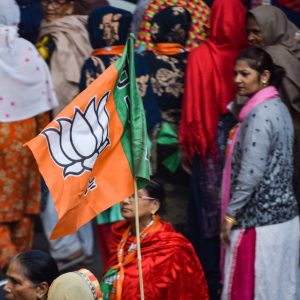In the ever evolving Indian electoral battlefield, the elusive Muslim vote continues to be a hot topic of discussion. As crucial states like Uttar Pradesh, Gujarat, and Himachal Pradesh go to polls at the local or regional level, all political parties in the fray are trying to garner popular support to win the elections. In this electoral logjam, the Muslim vote has often remained a prized electoral reward over the years.
While the Muslim vote has traditionally remained with the Indian National Congress (INC), recent election seasons have revealed the Bharatiya Janta Party (BJP)’s clandestine approach to garner the Muslim vote. In fact, contrary to existing perceptions, the BJP does not undervalue the Muslim vote and have been consistently keen to acquire it. However, the difference lies in its approach and its tacit machinations in acquiring Muslim votes — as the party adopts a clandestine, ad hoc approach to win the support of Muslims and its electoral strategy in doing so differs state-to-state depending on what favors the leadership of the time. On the question of Muslims, the party chooses to control the narrative on the ground to suit its state leadership and, of course, its electoral prospects.
For instance, in Uttar Pradesh, where municipal polls are in the offing, the BJP is leaving no stone unturned to garner the votes held by the “Pasmanda Muslims,” who comprise the underprivileged Muslims within eastern Uttar Pradesh. They constitute 85 percent of the Muslim vote share and their support could enable the BJP to win significant number of seats in the eastern part of the state — a region that is the home turf of sitting Chief Minister Yogi Adityanath. Adityanath was a five time member of Parliament from Gorakhpur, a key city in the region.
This strategy is in sync with the BJP’s plan of strengthening its vote share among the Other Backward Castes (OBCs) and forming an umbrella coalition with their support in the state to facilitate their victory in the upcoming 2024 general elections. In this endeavor, Adityanath, a fervent Hindu nationalist leader, has now led a rapprochement with Muslims in the state by solemnizing 1,300 Muslim weddings.
Interestingly, the BJP has adopted this strategy in Delhi as well — a state where the BJP has not won an assembly election in recent years. Hence, in the upcoming municipality elections, it has decided to seek Pasmanda Muslim votes to garner electoral victories. In the eastern state of Orissa, too, the BJP has traditionally eschewed using the “anti Muslim narrative” and the state leadership has harped on a more inclusive “Sabka Saath Sabka Vikaas” narrative as the local traditions within the state preach inclusivity.
While Muslims are an important vote bank for the BJP in Uttar Pradesh, in Indian Prime Minister Narendra Modi’s home state of Gujarat, the BJP has consistently done a volte face. Although Muslims constitute 9 percent of Gujarat’s population and have a sizable presence in around 25 assembly seats, the BJP has not fielded a single Muslim candidate in the upcoming state assembly elections. The party has followed the same strategy in Gujarat over the last few election cycles in which it has chosen to avoid giving tickets to Muslims in the state.
This electoral policy is in direct consonance with Modi’s image as the principal node of Hindutva politics in the state. In fact, a communist rightfully stated that “Modi sits on top of an anti Muslim consensus (within the state) and his popularity flows from this.” The BJP has systematically isolated the Muslims after the Ran Janmabhoomi Movement in the 1990s and more importantly, the Gujarat riots in 2002, and since then BJP’s electoral victories have been in consonance with Modi’s electoral victories. This exemplifies the BJP’s total boycott of the Muslim electorate within the state of Gujarat.
A similar strategy is being adopted by the BJP in Assam, where the party, under the leadership of Chief Minister Himanta Biswa Sharma, is alienating Bengali Muslim settlers by indulging in spurious rhetoric against the community. Discord between local Assamese and Bengalis has been a cause for perpetual social discord in the region. The same story is true for the election-bound states of Himachal Pradesh and Maharashtra, where the BJP has chosen to represent the interests of Hindus in keeping with its traditional Hindutva agenda.
These examples enable us to understand that the BJP’s alternating outreach to and sidelining of Muslims purely depends on its electoral strategy within different states for different elections. As the party has now firmly replaced the INC as the leading national party of India, it is attempting to be a more inclusive force to reckon with. It understands that completely alienating all Muslim voters is not an ideal situation. However, this dichotomy in the party’s treatment of Muslims hurts the very idea of India. The party seems oblivious to this fact.













